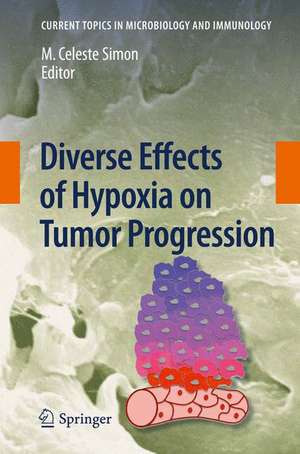Diverse Effects of Hypoxia on Tumor Progression: Current Topics in Microbiology and Immunology, cartea 345
Editat de M. Celeste Simonen Limba Engleză Hardback – 5 sep 2010
| Toate formatele și edițiile | Preț | Express |
|---|---|---|
| Paperback (1) | 1086.58 lei 6-8 săpt. | |
| Springer Berlin, Heidelberg – 5 noi 2012 | 1086.58 lei 6-8 săpt. | |
| Hardback (1) | 976.34 lei 38-44 zile | |
| Springer Berlin, Heidelberg – 5 sep 2010 | 976.34 lei 38-44 zile |
Din seria Current Topics in Microbiology and Immunology
- 18%
 Preț: 962.03 lei
Preț: 962.03 lei - 5%
 Preț: 1123.13 lei
Preț: 1123.13 lei - 5%
 Preț: 1085.95 lei
Preț: 1085.95 lei -
 Preț: 499.77 lei
Preț: 499.77 lei - 5%
 Preț: 967.81 lei
Preț: 967.81 lei - 18%
 Preț: 1118.62 lei
Preț: 1118.62 lei - 5%
 Preț: 717.00 lei
Preț: 717.00 lei - 5%
 Preț: 712.97 lei
Preț: 712.97 lei - 5%
 Preț: 709.51 lei
Preț: 709.51 lei - 5%
 Preț: 709.51 lei
Preț: 709.51 lei - 5%
 Preț: 721.19 lei
Preț: 721.19 lei - 5%
 Preț: 359.78 lei
Preț: 359.78 lei - 5%
 Preț: 711.88 lei
Preț: 711.88 lei - 5%
 Preț: 774.81 lei
Preț: 774.81 lei - 15%
 Preț: 640.06 lei
Preț: 640.06 lei - 5%
 Preț: 717.00 lei
Preț: 717.00 lei - 5%
 Preț: 360.34 lei
Preț: 360.34 lei - 5%
 Preț: 707.69 lei
Preț: 707.69 lei - 5%
 Preț: 717.56 lei
Preț: 717.56 lei - 5%
 Preț: 716.28 lei
Preț: 716.28 lei - 5%
 Preț: 717.20 lei
Preț: 717.20 lei - 5%
 Preț: 711.32 lei
Preț: 711.32 lei - 5%
 Preț: 711.88 lei
Preț: 711.88 lei - 5%
 Preț: 718.29 lei
Preț: 718.29 lei - 5%
 Preț: 709.51 lei
Preț: 709.51 lei - 5%
 Preț: 369.84 lei
Preț: 369.84 lei - 5%
 Preț: 712.25 lei
Preț: 712.25 lei - 5%
 Preț: 716.45 lei
Preț: 716.45 lei - 5%
 Preț: 706.60 lei
Preț: 706.60 lei - 5%
 Preț: 711.52 lei
Preț: 711.52 lei - 5%
 Preț: 713.54 lei
Preț: 713.54 lei - 5%
 Preț: 720.47 lei
Preț: 720.47 lei - 5%
 Preț: 725.42 lei
Preț: 725.42 lei - 5%
 Preț: 708.06 lei
Preț: 708.06 lei - 5%
 Preț: 713.70 lei
Preț: 713.70 lei - 5%
 Preț: 705.83 lei
Preț: 705.83 lei - 5%
 Preț: 710.96 lei
Preț: 710.96 lei - 5%
 Preț: 723.93 lei
Preț: 723.93 lei - 5%
 Preț: 707.69 lei
Preț: 707.69 lei - 5%
 Preț: 715.35 lei
Preț: 715.35 lei - 5%
 Preț: 709.87 lei
Preț: 709.87 lei - 5%
 Preț: 359.05 lei
Preț: 359.05 lei - 5%
 Preț: 374.20 lei
Preț: 374.20 lei - 15%
 Preț: 635.31 lei
Preț: 635.31 lei - 5%
 Preț: 707.86 lei
Preț: 707.86 lei - 5%
 Preț: 721.96 lei
Preț: 721.96 lei - 15%
 Preț: 632.88 lei
Preț: 632.88 lei - 15%
 Preț: 632.05 lei
Preț: 632.05 lei - 15%
 Preț: 642.83 lei
Preț: 642.83 lei
Preț: 976.34 lei
Preț vechi: 1027.73 lei
-5% Nou
Puncte Express: 1465
Preț estimativ în valută:
186.88€ • 203.06$ • 157.08£
186.88€ • 203.06$ • 157.08£
Carte tipărită la comandă
Livrare economică 17-23 aprilie
Preluare comenzi: 021 569.72.76
Specificații
ISBN-13: 9783642133282
ISBN-10: 3642133282
Pagini: 130
Ilustrații: X, 146 p.
Dimensiuni: 155 x 235 x 13 mm
Greutate: 0.36 kg
Ediția:2010
Editura: Springer Berlin, Heidelberg
Colecția Springer
Seria Current Topics in Microbiology and Immunology
Locul publicării:Berlin, Heidelberg, Germany
ISBN-10: 3642133282
Pagini: 130
Ilustrații: X, 146 p.
Dimensiuni: 155 x 235 x 13 mm
Greutate: 0.36 kg
Ediția:2010
Editura: Springer Berlin, Heidelberg
Colecția Springer
Seria Current Topics in Microbiology and Immunology
Locul publicării:Berlin, Heidelberg, Germany
Public țintă
ResearchCuprins
The HIF-2?-Driven Pseudo-Hypoxic Phenotype in Tumor Aggressiveness, Differentiation, and Vascularization.- Hypoxia and Hypoxia Inducible Factors in Cancer Stem Cell Maintenance.- Role of Carcinoma-Associated Fibroblasts and Hypoxia in Tumor Progression.- The Role of Hypoxia Regulated microRNAs in Cancer.- Oxygen Sensing: A Common Crossroad in Cancer and Neurodegeneration.- Hypoxia-Inducible Factors as Essential Regulators of Inflammation.- Hypoxia and Metastasis in Breast Cancer.
Textul de pe ultima copertă
Solid tumors frequently contain areas of oxygen deprivation (hypoxia) due to rapid cell proliferation and/or vascular insufficiency. The presence of hypoxic domains typically correlates with poor patient prognosis, due to the relative resistance of hypoxic cells to conventional cancer therapies and effects of O2 availability on disease progression. The response of malignant cells to hypoxia has been the focus of intense research over the last decade. In this issue of Current Topics in Microbiology and Immunology, the authors present articles describing the impact of hypoxia on components of the tumor microenvironment (such as endothelial cells, inflammatory cells, and tumor associated fibroblasts), the expression of unique microRNAs, tumor cell differentiation status, and metastasis. Each review article describes the state of the field studying these topics, and poses important questions for the future. The overall goal is to depict tumor phenotypes and associated molecular pathways to be exploited in the development of novel therapeutics to be used against a broad spectrum of human cancers.
Caracteristici
Hypoxia, defined as reduced oxygen tension, is a common physiological phenomenon in both normal embryonic development and malignancy progression Hypoxia promotes cancer progression by regulating various aspects of cancer biology, including radiotherapy resistance, metabolism, angiogenesis and invasion/migration














